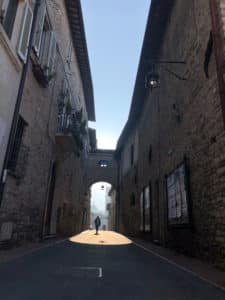I was eight years old when I went to confession for the first time. The whole idea of confession 
terrified me. Already very shy and mortally afraid of talking to people, I was not looking forward to telling a stranger all the bad things I had done.
The church was very bright and very full of people. All the second-graders were making their First Reconciliation that day. I sat with my family, unhappily wearing a jean dress and tights. Several priests sat around the church in makeshift confessionals. I recognized only one of them: my parish priest. He was funny, nice, and smiled a lot—the kind of guy you wouldn’t mind telling you had a history of hitting your sister. I decided that I was going to go to him.
My family values efficiency. Since the entire second-grade class had individually decided that they also wanted to go to the friendly priest, there was a long line by his chair next to the brightly-lit baptistry, and no line for the old, wizened priest in the dark shadows of the sacristy. My dad pushed me toward the sacristy.

I don’t remember what I confessed. But I do remember my penance.
My teacher had told our class about penance. It was something that we had to do to make up for our sins. God had forgiven us, but we had to make reparation. It was usually a little prayer, but sometimes the priest told you to do something as penance. My eight-year-old soul shivered at the thought of anything more than an Our Father.
The old priest was nice. He listened attentively. He said a few things, and then he gave me my penance, which, to my horror, was not a prayer. I was to tell my mom that I was sorry for disobeying her.
After absolution, I shuffled back to the pew, completely shocked. I knelt down and pretended to pray—because no one could know that I had been given something to do and not a prayer. Normal sins—normal people—got simple penances. But not me. I couldn’t decide if I had been particularly bad, or if the priest was particularly crazy. I was only eight! Didn’t he know I was only eight?
Anxiety ruined the rest of my day. I knew I had to tell my mom and I had to do it soon; if I didn’t, I’d have to go to confession again, and then the priest would make me do it anyway and I would get a new penance on top of the first penance. My mom had four other children at that point, with dinner to make, and things to clean. Dad was also home and obnoxiously in the same room—when was I supposed to catch her alone?
It wasn’t until after dinner that I was finally able to ambush her, hugging her leg and burying my face in her clothes, not out of affection, but so I could avoid looking at her.
“SorryIdisobeyedyou,” I mumbled.
She didn’t hear me, and I was forced to say it again. This time, I had to look up.
She laughed, accepted my apology, and gave me a hug. I think I ran away after that.
I’ve never had another penance so traumatizing. In the confessional for that first time, I most certainly did not have perfect contrition. In performing that first penance, I was more humiliated than contrite. But what didn’t initially touch my eight-year-old soul gradually warmed over the next decade and a half.
Since then, I’ve been given tasks to perform as penance, along with prayers of varying lengths,
but that first penance is forever burned on my heart. It sought to remedy my relationship with my mom, while at the same time stamping on all the pride I had acquired in eight years.
To me, that situation brought to life the way penance is described in the Catechism of the Catholic Church: “Those who approach the sacrament of Penance obtain pardon from God’s mercy for the offense committed against him, and are, at the same time, reconciled with the Church which they have wounded by their sins and which by charity, by example, and by prayer labors for their conversion” (CCC 1422).
By humbling ourselves to receive forgiveness, we give testimony to the loving power of justice and mercy. Wounds heal. Growth begins. Through the sacrament of Penance, we allow ourselves to once again be wrapped in the arms of our mother.
